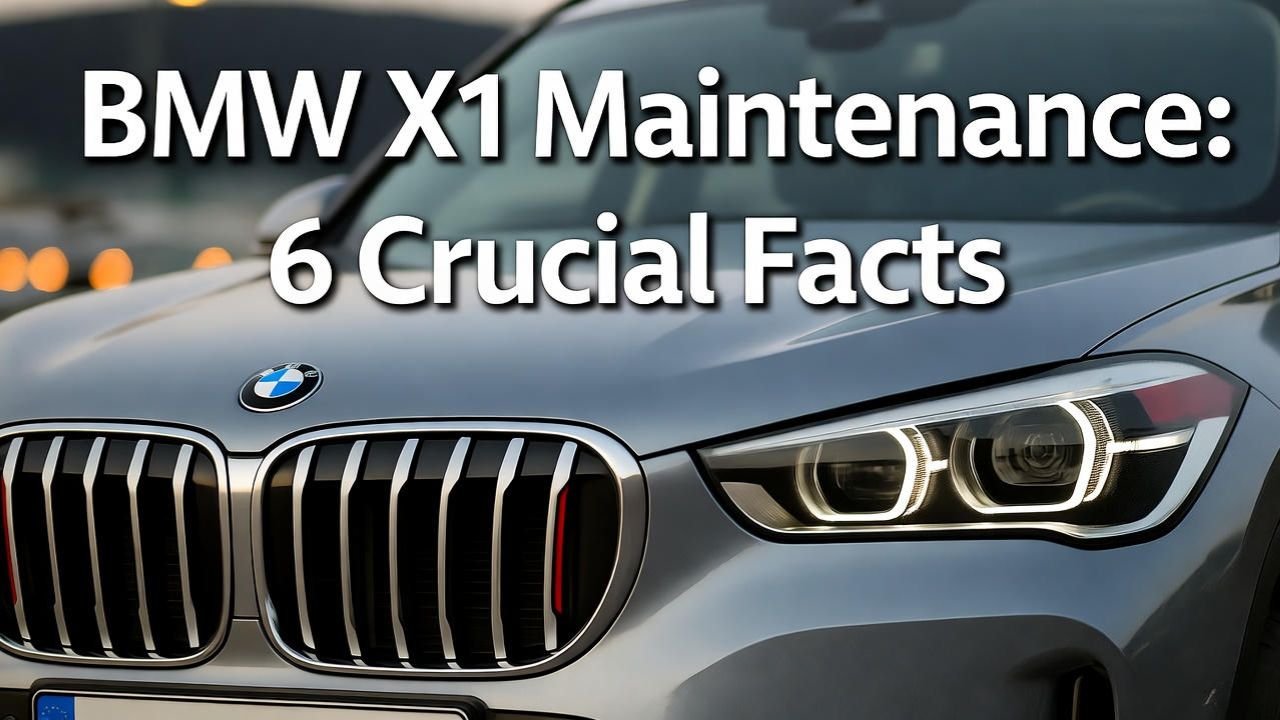BMW X1 Maintenance: 6 Crucial Facts

BMW X1 maintenance cost involves regular checks and fluid changes to keep your luxury SUV running smoothly. Owning a BMW X1 means prioritizing its upkeep through these 6 crucial facts to ensure longevity and performance.
Key Takeaways
- Understand BMW X1 maintenance schedules for optimal performance.
- Budget for routine BMW X1 service intervals carefully.
- Know common BMW X1 issues and their typical repair costs.
- Prioritize genuine BMW X1 parts for better longevity.
- Explore BMW X1 maintenance plans for cost savings.
- DIY checks can reduce overall BMW X1 ownership expenses.
Welcome to the world of BMW ownership! You’ve chosen the BMW X1, a fantastic compact luxury SUV known for its agile handling and premium feel. As a responsible car owner here in the USA, understanding your vehicle’s maintenance needs is paramount. It’s not just about keeping your X1 looking sharp; it’s about ensuring its safety, reliability, and long-term performance. Many find car maintenance a bit daunting, but with clear guidance, you’ll feel confident. This guide will break down the essential BMW X1 maintenance facts you absolutely need to know, making it easier to manage costs and keep your vehicle in top condition.
1. Decoding Your BMW X1 Maintenance Schedule: The Heartbeat of Your SUV

Your BMW X1 is a sophisticated machine, and like any high-performance vehicle, it thrives on a consistent and well-defined maintenance routine. BMW engineers have designed a specific schedule to ensure every component functions optimally and to prevent potential issues before they become costly problems. Ignoring this schedule is one of the quickest ways to increase your BMW X1 maintenance cost, leading to premature wear and tear on vital parts.
BMW’s iDrive infotainment system typically plays a key role in informing you about upcoming service. It uses sensors and algorithms to monitor driving conditions, mileage, and time intervals. You’ll usually see ‘Condition Based Service’ (CBS) alerts on your dashboard, indicating when specific maintenance items are due. These alerts might include oil changes, brake fluid flushes, or even inspections of the air filters.
The most common service intervals to be aware of include:
- Oil and Filter Changes: Typically recommended every 10,000 to 15,000 miles or annually, whichever comes first. This is crucial for lubricating the engine and removing contaminants.
- Brake Inspection: Regular checks on brake pads and rotors are vital for safety. The CBS will often prompt you when brake service is needed.
- Tire Rotation and Balancing: Essential for even tire wear and a smoother ride. This is usually recommended every 5,000 to 7,000 miles.
- Cabin Air Filter Replacement: Important for air quality inside your X1. Often recommended every 15,000 to 20,000 miles.
- Engine Air Filter Replacement: Affects engine performance and fuel efficiency. Typically replaced every 20,000 to 30,000 miles.
- Brake Fluid Flush: Over time, brake fluid absorbs moisture, reducing its effectiveness. This is usually recommended every 2-3 years.
- Coolant Flush: Prevents engine overheating and corrosion. Intervals can vary, but every 30,000 to 60,000 miles is common.
Understanding these intervals is the first step in managing your BMW X1 maintenance cost proactively. Your owner’s manual is your best friend here, providing specific recommendations for your model year and engine. For those in diverse driving conditions across the USA, such as stop-and-go city traffic in Los Angeles or highway cruising in Texas, the CBS system might adjust service needs accordingly.
2. Estimating Your BMW X1 Maintenance Cost: Beyond the Sticker Price
When you invest in a BMW X1, you’re buying into a luxury experience, which often comes with a slightly higher maintenance cost compared to non-premium brands. It’s essential to budget for this reality from the outset. The average BMW X1 maintenance cost can vary significantly based on your location in the USA, the specific services required, and whether you choose a dealership or an independent specialist for your repairs.
Several factors influence the overall cost:
- Labor Rates: Dealerships generally have higher labor rates than independent shops. However, dealerships offer specialized technicians and genuine BMW parts.
- Parts Quality: Using genuine BMW parts is often more expensive upfront but can lead to better longevity and performance, potentially saving money in the long run. Aftermarket or OEM parts can be cheaper but may not offer the same quality or fit.
- Service Type: Routine services like oil changes and tire rotations are less expensive than major repairs like transmission work or engine component replacement.
- Model Year and Mileage: Older X1 models with higher mileage might require more frequent and costly repairs as components naturally wear out.
Here’s a general idea of what you might expect for common services, keeping in mind these are estimates and can fluctuate:
| Service Item | Estimated Cost Range (USD) | Notes |
|---|---|---|
| Oil and Filter Change | $150 – $300 | Using synthetic oil. |
| Brake Pad Replacement (Front) | $300 – $600 | Per axle. |
| Brake Fluid Flush | $100 – $200 | Recommended every 2-3 years. |
| Tire Rotation and Balancing | $80 – $150 | Often included with other services. |
| Cabin Air Filter Replacement | $70 – $150 | DIY is possible for some. |
| Engine Air Filter Replacement | $80 – $180 | DIY is possible for some. |
| Spark Plug Replacement | $300 – $600 | Can vary depending on engine. |
| Coolant Flush | $150 – $250 | Using BMW-approved coolant. |
Don’t let these figures alarm you. Many owners find that by adhering to the maintenance schedule and taking advantage of available programs, the overall BMW X1 maintenance cost remains manageable. For instance, many new BMW vehicles come with a complimentary maintenance period, typically covering the first few years or a certain mileage, which can significantly offset initial expenses. This is a common perk for luxury car buyers in the USA.
3. Common BMW X1 Issues: Knowing What to Watch For
While the BMW X1 is generally a reliable vehicle, like all cars, it can develop specific issues over time. Being aware of these common problems can help you address them quickly, potentially preventing more extensive and expensive repairs. Understanding these potential pitfalls is crucial for managing your BMW X1 maintenance cost and ensuring your vehicle stays dependable.
Some issues that owners have reported with various BMW X1 generations include:
- Oil Leaks: Particularly from the valve cover gasket or oil pan gasket. Early detection is key to preventing oil starvation and engine damage.
- Cooling System Leaks: Issues with the water pump, thermostat, or hoses can lead to overheating. Regular coolant level checks are important.
- Turbocharger Problems: While not excessively common, turbo components can fail, leading to reduced power and unusual noises.
- Electrical Gremlins: Like many modern cars, the X1 can sometimes experience minor electrical glitches, such as issues with sensors or infotainment system quirks.
- Transmission Shudder: Some owners have reported slight hesitations or shudders during gear changes, especially in older models. Regular transmission fluid changes can help mitigate this.
- Wiper Blade Wear: Premium vehicles often use high-quality wiper blades that require replacement periodically for optimal visibility, especially during rainy seasons across the USA.
When you notice any unusual sounds, smells, or changes in your X1’s performance, it’s best to consult a qualified mechanic or your BMW dealership promptly. Early diagnosis is often the most cost-effective solution. For a comprehensive look at potential issues and recalls specific to your X1 model, you can check resources from the National Highway Traffic Safety Administration (NHTSA) at nhtsa.gov.
Pro Tip: Regularly check your car’s tires for proper inflation and any signs of uneven wear. This not only improves fuel economy and handling but can also alert you to underlying suspension or alignment issues that might require attention.
4. The Importance of Genuine BMW X1 Parts
When it comes to maintaining your BMW X1, the choice of parts can significantly impact its performance, longevity, and even your overall BMW X1 maintenance cost in the long run. While aftermarket parts might seem appealing due to lower prices, using genuine BMW parts offers distinct advantages that align with the premium quality of your vehicle.
Here’s why genuine parts are often the better choice:
- Perfect Fit and Compatibility: Genuine BMW parts are designed and manufactured to exact specifications for your specific X1 model. This ensures a perfect fit, seamless integration with existing components, and optimal performance.
- Superior Quality and Durability: BMW invests heavily in research and development to ensure their parts meet stringent quality and durability standards. This often translates to a longer lifespan and better reliability compared to many aftermarket alternatives.
- Warranty Protection: Using genuine BMW parts, especially when installed by a BMW dealership, often comes with its own warranty. This can provide peace of mind and protect you from further expenses if a part fails prematurely.
- Maintaining Resale Value: A vehicle maintained with genuine parts is often perceived as having been better cared for, which can contribute to a higher resale value in the competitive USA automotive market.
- Performance and Efficiency: The precise engineering of genuine parts ensures your X1 performs as intended by BMW engineers, maintaining its fuel efficiency and driving dynamics.
While the initial cost of a genuine BMW part might be higher, consider it an investment in the integrity and longevity of your vehicle. For critical components like engine parts, transmission elements, or braking systems, the benefits of using genuine parts usually outweigh the upfront savings of cheaper alternatives.
5. Exploring BMW X1 Maintenance Plans and Service Packages
Managing your BMW X1 maintenance cost effectively often involves looking into the various service plans and packages offered by BMW. These programs are designed to provide predictable expenses and can offer significant savings compared to paying for each service individually. For new car buyers in the USA, understanding these options upfront can be a smart financial move.
BMW often offers programs like:
-
- BMW Ultimate Care: This is BMW’s complimentary scheduled maintenance program that typically comes standard with new vehicles. It covers routine maintenance services as specified by the vehicle’s Condition Based Service system for a set period or mileage (e.g., 3 years or 36,000 miles). This can cover oil changes, brake fluid flushes, inspections, and more.
<li-BMW Ultimate Care+: For those looking for extended coverage beyond the standard complimentary period, Ultimate Care+ is a prepaid maintenance program. You can purchase it at the time of vehicle sale or within the first year. It offers coverage for scheduled maintenance services for a longer duration, often up to 7 years or 100,000 miles. This provides excellent long-term cost predictability.
- Wear and Tear Items: Some packages might also include coverage for common wear-and-tear items like brake pads, rotors, and wiper blades, which can be significant expenses over the life of the vehicle.
When considering these plans, it’s important to:
- Read the Fine Print: Understand exactly what services are covered, the duration of the plan, and any limitations.
- Compare Costs: Calculate the potential cost of individual services versus the price of the maintenance plan to see if it offers a genuine saving for your driving habits.
- Consider Your Ownership Period: If you plan to keep your BMW X1 for many years, an extended plan like Ultimate Care+ can be particularly beneficial.
These plans are especially valuable in the USA, where labor and parts costs can be higher than in other regions. By consolidating your maintenance expenses into a single, prepaid package, you can better budget for your BMW X1 ownership and avoid unexpected bills. You can discuss these options with your BMW dealership when purchasing your vehicle or explore them through BMW Financial Services.
6. DIY Checks: Empowering You to Reduce BMW X1 Maintenance Cost
While professional servicing is essential for complex tasks, there are several simple checks and maintenance tasks you can perform yourself on your BMW X1. These DIY efforts not only empower you with a better understanding of your vehicle but can also lead to significant savings on your BMW X1 maintenance cost. It’s about being proactive and observant.
Here are some easy DIY checks you can do:
- Tire Pressure: Regularly checking and adjusting tire pressure is one of the easiest ways to improve fuel efficiency, tire longevity, and safety. Most gas stations in the USA have air pumps, and your X1’s recommended pressure is usually found on a sticker inside the driver’s side doorjamb.
- Fluid Levels: While many modern cars have sealed systems, you can often check the windshield washer fluid and coolant levels visually under the hood. Keep a bottle of BMW-approved windshield washer fluid handy.
- Wiper Blades: Inspect your wiper blades for cracks or stiffness. If they’re leaving streaks, it’s time for a replacement. Many auto parts stores offer installation services, or you can often find DIY guides online for your specific X1 model.
- Lights: Periodically walk around your X1 and check that all exterior lights are functioning correctly – headlights, taillights, brake lights, and turn signals. Replacing a burnt-out bulb is often a straightforward DIY task.
- Cabin Air Filter: For many car models, including some BMW X1 variants, replacing the cabin air filter is a relatively simple process that involves accessing it behind the glove box. A clean cabin filter improves air quality inside your vehicle. You can find helpful video tutorials on platforms like YouTube.
Remember to always consult your BMW X1 owner’s manual before attempting any DIY maintenance. It provides specific instructions tailored to your vehicle. For tasks involving engine oil, brakes, or other critical systems, it’s generally best to leave it to qualified professionals to ensure the work is done correctly and safely. However, these simple checks can make a difference in catching minor issues early.
A great resource for DIY tips and guides specific to BMW vehicles is the Bimmerfest community forum, where enthusiasts share knowledge and experience.
Frequently Asked Questions (FAQs) About BMW X1 Maintenance
Q1: How often should I change the oil in my BMW X1?
BMW typically recommends oil changes every 10,000 to 15,000 miles or once a year, whichever comes first. Your X1’s Condition Based Service (CBS) system will alert you when an oil change is due.
Q2: Is BMW X1 maintenance expensive compared to other compact SUVs?
Generally, luxury vehicles like the BMW X1 tend to have higher maintenance costs due to the specialized parts and labor involved. However, with proper care and maintenance plans, the cost can be managed.
Q3: Can I use non-BMW branded oil or parts?
While some aftermarket parts may work, it is highly recommended to use genuine BMW parts and BMW-approved fluids. This ensures optimal performance, longevity, and compatibility with your vehicle’s systems, and helps maintain any existing warranty.
Q4: What is BMW Ultimate Care?
BMW Ultimate Care is a complimentary scheduled maintenance program that often comes with new BMW vehicles. It covers routine services like oil changes, brake fluid flushes, and inspections for a specified period or mileage, usually 3 years or 36,000 miles.
Q5: How do I know if my BMW X1 needs brake service?
Your BMW X1’s CBS system will alert you when brake pads or fluid service is needed. You might also notice a grinding noise when braking, a spongy brake pedal, or the brake warning light illuminating on your dashboard.
Q6: Are there any common issues specific to the BMW X1?
Common reported issues can include minor oil leaks from gaskets, potential cooling system leaks, and occasional electrical system quirks. Regular maintenance and prompt attention to any warning signs are key to addressing these.
Q7: Where can I find a certified BMW technician in the USA?
You can find certified BMW technicians at any authorized BMW dealership. Independent European car specialists who focus on BMWs can also be a good option, often offering competitive pricing.
Maintaining your BMW X1 is an integral part of the ownership experience, especially when navigating the diverse driving landscape of the USA. By understanding your vehicle’s specific maintenance schedule, budgeting for potential costs, being aware of common issues, and leveraging programs like BMW Ultimate Care, you can ensure your X1 remains a reliable and enjoyable luxury SUV for years to come. Remember, consistent care not only preserves your vehicle’s performance and safety but also protects your investment. Happy driving!




